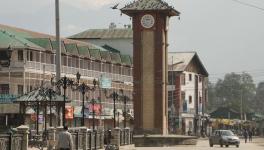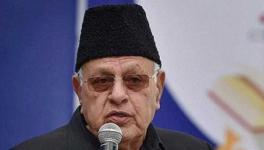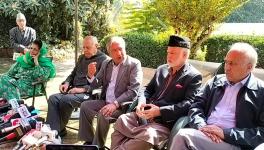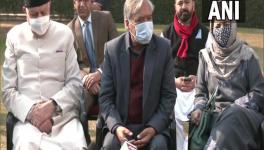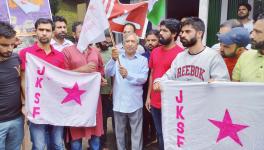DDC Chairmanship Polls: PAGD Falls Behind Expectations
File Photo.
Srinagar: The People’s Alliance for Gupkar Declaration (PAGD) has performed below expectations in the latest District Development Council (DDC) chairmanship polls despite their earlier victory in the first major electoral exercise following the abrogation of Article 370 and 35 A.
In the DDC polls, the alliance – a grouping of seven mainstream political parties in the region formed against the Bhartiya Janata Party (BJP) to safeguard J&K’s ‘special status’ -- won the highest number of seats across the union territory. The National Conference (NC) secured a majority 67 seats in the total 110 seats won by the PAGD which was fighting on a seat-sharing basis against the BJP and its allies.
The performance of PAGD in Jammu division turned out to be abysmal as BJP and independents swept the region.
The alliance, formally stitched in October last year, won with a clear majority in six districts of the Kashmir valley with more than nine seats of the total 14 seats in at least Anantnag, Budgam, Ganderbal, Pulwama, Kulgam and Kupwara. With these numbers PAGD was set to lead in nine out of 10 districts in the Valley but, the alliance managed only five wins after losing Kupwara and Budgam while NC lost its Srinagar bastion to Apni Party led by Altaf Bukhari – a People’s Democratic Party (PDP) defector.
Former J&K chief minister Omar Abdullah has since alleged ‘rigging’ by authorities at Budgam and claimed that he would initiate a legal battle against the outcome in the central Kashmir district, where the alliance has nine out of 14 seats and yet an independent candidate emerged victorious on the chairperson’s seat. The vice-chairperson’s seat was interestingly secured by NC.
“All this was done with the active involvement of the district administration which issued blatant threats about the powers to detain people for 2 years. Early next week we will challenge this undemocratic action in the courts of law,” Omar Abdullah tweeted soon after the results.
The allegations against the UT administration and police authorities were made earlier by PDP president Mehbooba Mufti, who claimed that they are ‘involved in horse-trading’ and are tinkering with the outcome of DDC polls.
The PAGD despite its victory in the DDC polls was met with several roadblocks since its formation and was first dumped by Congress party, whose partnership with the parties remains ambiguous. The Congress party played spoilsport claiming to have had a seat-sharing arrangement in Kashmir Valley and saying it does not consider itself a constituent of the alliance against BJP, contrary to its commitment it made during the first Gupkar Declaration.
Another former constituent, Jammu and Kashmir People’s Conference (JKPC), led by former separatist turned BJP’s former ally Sajad Lone, also parted ways with the alliance on charges that PAGD parties fielded proxies against its candidates, a claim that seemed plausible. Lone’s PC managed to win the chairmanship at Kupwara where the party’s influence has been traditionally confined. The party managed another vice-chairman seat in district Baramulla where an independent candidate Safina Beigh won the chairperson seat.
Safina is the wife of senior politician Muzaffar Hussain Beigh, a former Deputy chief minister of J&K and the architect of PDP-BJP alliance in 2014. She is officially part of the PDP but fought the DDC polls in her constituency against the PAGD candidate and received support from JKPC for her second victory.
Muzaffar Hussain was also part of the first Gupkar meeting held on August 4, 2019, a day before the government would strike down the Article 370 and incarcerate all the leaders. He has since parted ways with the alliance and PDP and is acting more independently, trying to consolidate his own position in the regional political landscape. This, after he was involved as a key actor in the formation of PDP and JKPC.
Following the council polls, most of the parties have secured only pockets of influence across the UT. The parties have also reconciled with the voting pattern which emerged during the DDC polls held since November 2020 something that will reflect in the “soon-to-be-held” Assembly elections as well. In that case, whether parties stay together or not remains to be seen.
Then, there is also pressure. The pressure that pushed former bureaucrat turned politician Shah Faesal, who saw the post-370 politics through the prism of “separatist-or-stooge” binary, into complete submission. Many have submitted and more are likely to give-in as not too many from the mainstream are willing to make an enemy out of New Delhi.
Meanwhile, NC on Sunday denounced locking-up of party President, Member of Parliament from Srinagar Farooq Abdullah and Vice President Omar Abdullah at their residence terming the measures “arbitrary” and “gross intrusion of fundamental rights.”
"The amorality of the government’s treatment towards mainstream leaders is certainly dispiriting, but dangerous as well on account of the political vacuum it will create. Having a sitting MP, former chief minister and former union minister Dr Farooq Sahib's stature confined will prove a bad bet,” a party statement read.
The authorities said the leaders were barred in view of a security threat on the anniversary of Pulwama attack in which over 40 CRPF personnel were killed.
Get the latest reports & analysis with people's perspective on Protests, movements & deep analytical videos, discussions of the current affairs in your Telegram app. Subscribe to NewsClick's Telegram channel & get Real-Time updates on stories, as they get published on our website.










